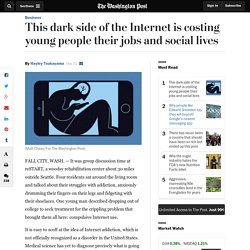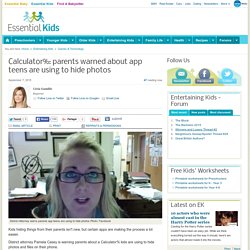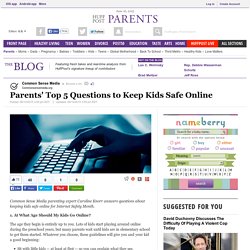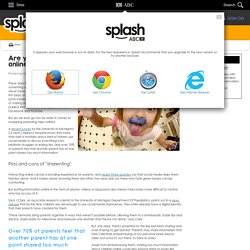

This dark side of the Internet is costing young people their jobs and social lives. (Matt Chase/For The Washington Post) FALL CITY, WASH. — It was group discussion time at reSTART, a woodsy rehabilitation center about 30 miles outside Seattle.

Four residents sat around the living room and talked about their struggles with addiction, anxiously drumming their fingers on their legs and fidgeting with their shoelaces. One young man described dropping out of college to seek treatment for the crippling problem that brought them all here: compulsive Internet use. It is easy to scoff at the idea of Internet addiction, which is not officially recognized as a disorder in the United States.
Medical science has yet to diagnose precisely what is going on in the brains of the addicted, and there is no clear definition of what entails an Internet addiction. A recent study by Common Sense Media, a parent advocacy group, found that 59 percent of parents think their teens are addicted to mobile devices. “We are a guinea pig generation,” he said. Lesson plans for secondary classes. Games, apps and social networking sites. No excuses when it comes to kids and porn. Pornography is easily accessible to children online.

Photo: Phil Carrick The sooner parents realise the risk their child will be exposed to pornography online is real the better. No longer is it OK, if it ever was, to say, "I don't understand tech", or "I don't use it, so I don't get it". The internet and all the wonderful and not so wonderful things about it are here to stay and parenting in the 21st century requires you to be able to parent online. Cries of it's just "moral panic", or "the risks are just not that bad" still permeate the "mummy blogs" of the uneducated and ignorant, who unfortunately have access to a large number of vulnerable parents, hungry for advice.
The fact is that pornography and easy access to it is something parents must understand. A 2009 study found, "that early exposure to sexually explicit material increases the likelihood that both male and female adolescents will engage in oral sex and sexual intercourse earlier than their non-exposed peers". Calculator%: parents warned about app teens are using to hide photos. Games & Technology District Attorney warns parents app teens are using to hide photos Photo: Facebook Kids hiding things from their parents isn't new, but certain apps are making the process a lot easier.

Cyber bulling: New password sharing trend on the rise. White-washing your online history. Paedophile preys on students in class via chat site. A sexual predator has used a webcam to masturbate in front of Year 7 students at a Victorian state high school.

Police have investigated the disturbing incident, which took place on Thursday and involved two students at Lilydale Heights College and an unknown man. During a class in the library, a 12-year-old used her laptop to visit the live camera chat website Omegle, which spruiks itself as a place to "talk to strangers" and has been known to attract paedophiles. The 12-year-old and her friend were then exposed to an adult performing the sexual act.
The incident is another sign schools are losing the battle against online safety, and follows revelations in Fairfax Media on Monday that seven-year-olds were exposed to pornography at a Catholic school. A parent at Lilydale Heights who alerted police to the incident said the man could see the students in their school uniforms. Outreach Cybersafety presentations and workshops for schools and families: Cybersmart. What is Outreach?

Cybersmart Outreach has been developed to train students, parents and teachers about online safety through the provision of web based and face to face events. The Cybersmart Outreach program has been in high demand since its introduction, with many schools booking for repeat presentations. Parents' Top 5 Questions to Keep Kids Safe Online Common Sense Media parenting expert Caroline Knorr answers questions about keeping kids safe online for Internet Safety Month. 1.

10 Important Password Tips Everyone Should Know. Your bank data, your accounts, your email, and your life are all wrapped up in your ability to create secure passwords and remember them.

And yet most educators (and their students) struggle to remember passwords. With so many passwords stolen, there are things all of us SHOULD know to make our identities and bank accounts safer. Mark Burnett, author of the most commonly used passwords wordcloud featured on this post, says that the top 10,000 passwords represent 98.8% of all users. 2014 Recap: 15 Top Resources On Digital Citizenship. A lot of the facts you teach your students will be long forgotten by the time they reach graduation, but the hope is that the practical lessons — the ones that can benefit them for years to come — are the ones that will stick.

Digital citizenship is something that can equip students for a lifetime of safe, responsible Internet use. How can you mold your students into stand-up digital citizens? Use these resources to help you plan your lessons. Ready-Made Lesson Plans to Launch Learning About Digital Citizenship Image via Flickr by hackNY Ready-made lesson plans about digital citizenship can serve as the perfect launchpad for discussing this topic in class. In honor of Digital Citizenship week, Edutopia put together a list of the latest and best resources to help educators bring digital citizenship awareness to their classrooms. Engaging Games to Promote Digital Citizenship Furthering the Discussion. 9 Traits of Good Digital Citizens. Are you compromising your children's privacy online? - Marianne Stenger - ABC Splash - These days if you don't take a picture of something and post about it, it may as well never have happened.

Whether it's a child's first steps or an amusing anecdote about a potty training mishap, most of us think nothing of sharing our childrearing highs and lows publicly through personal blogs or sites like Facebook and YouTube. Snapchat and 7 More Iffy Messaging Apps Teens Love. You probably never thought you'd see the day when Facebook wasn't the center of teens' universe.

But keeping up with Facebook friends through ad-filled news feeds and lengthy profiles, especially given the fact that everyone knows your name, is starting to feel tiresome to many teens. Facebook is still a go-to place for many things, such as wishing someone a happy birthday or stalking a crush. However, newer social apps make it easier, faster, and more fun to capture and share fleeting moments -- sometimes anonymously. These temporary and anonymous-messaging apps provide an environment that feels more appropriate to the random, silly, saucy, and experimental sides of the average teenager. A reminder that your Instagram photos aren’t really yours: Someone else can sell them for $90,000.
Richard Prince’s Instagram screenshots at Frieze Art Fair in New York. (Marco Scozzaro/Frieze) The Internet is the place where nothing goes to die. Those embarrassing photos of your high school dance you marked “private” on Facebook? The drunk Instagram posts? Online Safety: A Teacher’s Guide to Dealing with Cyberbullying, Sexting, and Student Privacy. Social media and text messages have blurred the lines between students’ school lives and private lives. While most schools take clear steps to protect students at school, more schools are beginning to consider the need to set policies that apply to students’ activities outside of school. When it comes to questionable online activities like cyberbullying and sexting, kids sometimes feel pressured to follow the crowd.
Teachers can play a crucial role in setting high expectations for online behavior. Schools can open conversations about online safety so that students learn to set personal boundaries and feel more comfortable reporting incidents like bullying and harassment. Image via Flickr by Brad Flickinger. TAGGED. THE CYBER BULLYING VIRUS. What can schools do about bullying? Team leaders: Jonathon Magrath and Sophie Goldrick, year 10 students at Koonung Secondary College, are helping to trial the Peaceful Schools Program there. Photo: Joe Armao It started, as is so often does with girls, with a whispering campaign.
Cybersafety educational resources for teachers and schools: Cybersmart. Professional development The Cybersmart Outreach program has been in high demand since its introduction, with many schools booking for repeat presentations. Over 2015 the ACMA will be placing a high priority on visiting those schools who have already registered, but have not yet received, one of our presentations. What Your Students Really Need to Know About Digital Citizenship.
In my classroom, I use two essential approaches in the digital citizenship curriculum that I teach: proactive knowledge and experiential knowledge. 'Sexting' now banned in Victoria. Changes in the law apply from Monday in Victoria. Photo: Glenn Hunt. A Good Digital Citizenship Poster from Edmodo. The Secret Language of Girls on Instagram. What's your digital footprint? Anti-Bullying and Cybersafety. St Michael’s Catholic Parish Primary School does not tolerate bullying in any form. Guided by our leadership team, all members of the school community are committed to ensuring a safe and caring environment, which promotes positive self esteem and personal growth intellectually, physically, socially, emotionally, aesthetically and morally.
Teens Using Apple Airdrop Instead Of Snapchat And Instagram - Business Insider. What is Twitter? A Parent’s Guide - Safe Smart & Social. We created this a parent’s guide to help you better understand What is Twitter, a popular app that Teens are using. Cyberbullying and why we need an e-safety commissioner. Safety: The government has promised to protect children from cyber bullying.
It had aimed to legislate on the issue by the end of 2014. Today is Safer Internet Day. Zombieland? Tech Wrecking Sleep for Scores of Teens: Study. Maybe they should be dubbed Generation-Zzzz. Teens who bury their faces for hours on end in laptops, tablets, smart phones or TV screens during the days tend to suffer bad nights of sleep, researchers reported Monday.
Instructional Technology. Tread very carefully ... you're leaving digital footprints. Snap: Teenagers connect and express themselves via digital media but might be less conscious of how the footprint that follows their photos, videos and posts will affect them as adults. Ethan Czahor, Who Lost His Job for Offensive Tweets, Creates App. Ethan Czahor’s dreams collapsed on the national stage earlier this year. The 31-year-old age digital whiz had spent years positioning himself to work in politics and earlier this year Jeb Bush’s campaign came calling, hiring Czahor as its chief technology officer. He lasted 36 hours, done in by a history of offensive tweets and blog posts that was uncovered by reporters and opposition researchers after TIME broke the news of his hire. Teens, Social Media & Technology Overview 2015.
24% of teens go online “almost constantly,” facilitated by the widespread availability of smartphones. Aided by the convenience and constant access provided by mobile devices, especially smartphones, 92% of teens report going online daily — including 24% who say they go online “almost constantly,” according to a new study from Pew Research Center. More than half (56%) of teens — defined in this report as those ages 13 to 17 — go online several times a day, and 12% report once-a-day use.